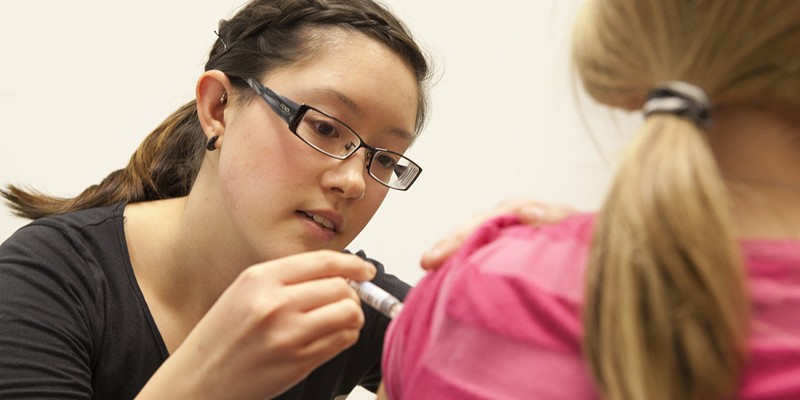Though science has yet to find a causal link between certain vaccines and autism, a vocal faction of parents take to Twitter in large numbers to espouse anti-vaccine sentiments, according to a new study from the University of Colorado Boulder.
“The debate online is far from over. There is still a very vocal group of people out there who are opposed to vaccines,” says study co-author Chris Vargo, an assistant professor in the CU Boulder College of Media Communication and Information. “Half of the talk online that we observed about vaccines was negative.”
Particularly vocal are parents in more affluent areas, and states including California, Connecticut, Massachusetts, New York and Pennsylvania. In Colorado, the most active anti-vaccers on Twitter are in Fort Collins, with 59 percent of vaccine-related tweets over five years espousing negative views. Denver saw just 24 percent over the same time period.
An autism researcher at the University of Alabama "created a machine-learning algorithm to examine more than a half-million tweets from around the country between 2009 and 2015. To make the sample a manageable size, they looked only at tweets that referred to both autism spectrum disorder and vaccines," according to a CU Boulder statement.
The study's backers hope that physicians and health departments can eventually use the data to identify anti-vaccine "hotbeds" in their communities and create targeted campaigns that tout the latest vaccine research.
“Time and time again, researchers have tried to substantiate this idea that there is a link between autism and vaccines, but they have not been able to,” says study co-author Theodore Tomeny, the autism researcher at the University of Alabama. “Unfortunately, the idea is still very much out there, being promoted by a vocal minority online. That’s problematic, because often only one side of the story is being told.”
Which reminds us: The Centers for Disease Control recommends getting a flu shot before the end of October.
[
{
"name": "Air - MediumRectangle - Inline Content - Mobile Display Size",
"component": "12017618",
"insertPoint": "2",
"requiredCountToDisplay": "2",
"watchElement": ".fdn-content-body",
"astAdList": [
{
"adType": "rectangle",
"displayTargets": "mobile"
}
]
},{
"name": "Editor Picks",
"component": "17242653",
"insertPoint": "4",
"requiredCountToDisplay": "1",
"watchElement": ".fdn-content-body",
"astAdList": [
{
"adType": "rectangle",
"displayTargets": "desktop|tablet"
},{
"adType": "rectangle",
"displayTargets": "desktop|tablet|mobile"
}
]
},{
"name": "Inline Links",
"component": "18838239",
"insertPoint": "8th",
"startingPoint": 8,
"requiredCountToDisplay": "7",
"maxInsertions": 25
},{
"name": "Air - MediumRectangle - Combo - Inline Content",
"component": "17261320",
"insertPoint": "8th",
"startingPoint": 8,
"requiredCountToDisplay": "7",
"maxInsertions": 25,
"watchElement": ".fdn-content-body",
"astAdList": [
{
"adType": "rectangle",
"displayTargets": "desktop|tablet"
},{
"adType": "rectangle",
"displayTargets": "desktop|tablet|mobile"
}
]
},{
"name": "Inline Links",
"component": "18838239",
"insertPoint": "8th",
"startingPoint": 12,
"requiredCountToDisplay": "11",
"maxInsertions": 25
},{
"name": "Air - Leaderboard Tower - Combo - Inline Content",
"component": "17261321",
"insertPoint": "8th",
"startingPoint": 12,
"requiredCountToDisplay": "11",
"maxInsertions": 25,
"watchElement": ".fdn-content-body",
"astAdList": [
{
"adType": "leaderboardInlineContent",
"displayTargets": "desktop|tablet"
},{
"adType": "tower",
"displayTargets": "mobile"
}
]
}
]












